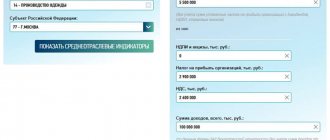When a taxpayer submits reports, the Federal Tax Service launches a desk audit procedure that checks declarations for completeness and timeliness of taxes paid to the state treasury.
The legislation of the Russian Federation approves about 20 types of taxes, and reporting is provided for each.
A separate service has been formed to process incoming information to the Federal Tax Service. The article will discuss what the desk audit department is, what it does, what responsibilities and powers are assigned to employees.
What it is
Before considering the main tasks and structure, it is necessary to give a clear definition that will reflect the essence of the work of the desk audit department .
This department represents a team of tax employees whose main task and function is to monitor compliance with the tax obligations of enterprises based on the reporting they provide. In general, the main function of the department can be described as the verification of tax reports and documentation. The peculiarity of the employees of this department is that all the work on analyzing and studying documents takes place in the department of the tax service itself, without visiting taxpayers.
OKTMO Codes of Municipal Entities (MO):
| No. MO | Name | TIN | OKTMO | OKATO |
| Biryulyovo-Zapadnoe | 45912000 | |||
| Biryulyovo-East | 45911000 | |||
| Orekhovo-Borisovo Northern | 45921000 | |||
| Orekhovo-Borisovo Yuzhnoye | 45922000 | |||
| Chertanovo Yuzhnoe | 45926000 | |||
| Brateevo | 45913000 | |||
| Zyablikovo | 45916000 | |||
| Moskvorechye-Saburovo | 45917000 | |||
| Nagatino-Sadovniki | 45918000 | |||
| Nagatinsky backwater | 45919000 | |||
| Tsaritsyno | 45923000 |
What does the desk audit department do in the tax service?
As already noted, the main function of tax inspectors from the audit department is to analyze and study the financial reports of taxpayers. In addition, the list of responsibilities of department employees includes the following tasks :
- Reception and processing of documentation related to tax calculations and payments.
- Consideration of controversial issues arising in the process of calculating contributions and other payments.
- Initiating audits and sending requests to other tax authorities in order to obtain information about the taxpayer.
- Preparation of the legislative framework for competent registration of violations against unscrupulous citizens.
It is worth noting that the duties of employees include processing documents for all available reports. After identifying deficiencies in the documentation, the inspector is obliged to initiate proceedings against the taxpayer.
Management staff of the inspection:
| job title | FULL NAME. | internal phone | cabinet | business hours | reception phone |
| Head of Inspectorate | Tolstova Tatyana Alekseevna | 16-696 | 3.1.1 | Thu: 9:00-18:00 | 8-495-400-28-21 8-495-400-00-33 |
| Secretary to the Chief of Inspectorate | Petrova Elena Petrovna | 3.1 | |||
| Deputy Chief | Bordacheva Svetlana Vladimirovna | 3.5 | Wed: 14:00-17:00 | ||
| Deputy Chief | Pishchikova Irina Iosifovna (ESD) | 3.4 | |||
| Deputy Chief | Nabokov Alexander Vladimirovich | 2.4 | Mon: 14:00-17:00 | ||
| deputy chief | Tuchkov Vladimir Grigorievich | 2.11 | Tue: 14:00-17:00 |
Objects of inspections
Any commercial enterprises and legal entities that receive profit as a result of their activities may be subject to inspections by the office department . It is now quite common practice for only those organizations that are engaged in commercial activities to be inspected.
If necessary, tax inspectors from the office department can begin checking various religious and charitable organizations that do not make a profit.
As a rule, in most cases, only those enterprises and organizations that, in the course of their activities, have already had shortcomings in the matter of taxation are subject to inspection. Also often subject to inspections are those commercial organizations whose tax payments are much lower than payments made by enterprises of the same income level.
With timely and “transparent” payment of contributions and taxes on the part of enterprises, the likelihood of meeting with the office department is sharply reduced , because The main share of all audits carried out by the tax service falls on already “notified” organizations.
Definition of the concept
There is no tax office that does not have a desk audit department; what it does can be understood from the name. Enterprises, individual entrepreneurs and legal entities regularly become the object of his close attention. persons who are engaged in commercial activities and are required to pay taxes on time. In rare cases, inspectors may check charities and some other organizations that are not engaged in business activities. Particular attention is paid to those enterprises that are characterized by the following features:
- their tax base is lower than that of similar organizations;
- their statements contain more expenses (deductions) than income;
- They have only losses over several tax periods.
The legislative framework
In the process of work, employees of the desk inspection department are guided by acts and decrees strictly prescribed by law. At the moment, the camera room is obliged to use in its work the rules of law prescribed in articles , , , of the Tax Code of the Russian Federation.
Orders of the Federal Tax Service (FAS) also have supreme force for department employees. All main issues related to the desk department are clearly stated in Article 88 of the Tax Code of the Russian Federation.
In addition to the fact that tax officials rely on already published legislative acts, the office department carefully monitors all changes in legislation . Such monitoring of the legislative framework allows inspectors to carry out their activities with maximum efficiency.
Features of work
The department of desk audits in the tax service, when performing its functions, is guided by the norms of the current tax legislation: Art. 87, 88, 90, 91, 93, 95, 97, 100 of the Tax Code of the Russian Federation. The specifics of conducting a desk audit are prescribed in Article 88 of the Tax Code of the Russian Federation. Each department employee must be aware of the latest changes in legislation.
So, the desk audit department is a division of the tax inspectorate. Its employees study the documentation provided by the taxpayer, check the accuracy of the information, and suppress any attempts to break the law. They also decide whether to transfer information about the entrepreneur to the debt settlement department or whether to conduct an on-site inspection.
The peculiarity of a desk audit is that it is carried out without a direct visit to the taxpayer, and also that only declarations submitted by taxpayers are studied.
The duration of a desk audit according to the Tax Code is strictly limited. It lasts three months from the date of filing the taxpayer’s declaration, as well as other documents on the basis of which taxes are calculated and paid.
However, in certain cases, the duration of the desk audit may be increased. The list of such reasons is contained in Art. 88 of the Tax Code of the Russian Federation.
If during an audit of a taxpayer, one or another violation of tax legislation is discovered, as well as any discrepancy in the documentation, then in accordance with Article 100 of the Tax Code, a desk audit report is drawn up, in which all identified violations are recorded.
The activities of desk audit departments of tax authorities contribute to filling the federal and local budgets by collecting unpaid taxes and fees, as well as eliminating other identified violations in the tax field.
Goals and types
The main task of inspections carried out by employees of the department is to identify violations by taxpayers and individual commercial enterprises .
The cameral department is obliged to regulate compliance with tax laws by citizens, as well as to help prevent violations. If violations are detected, inspectors are required to initiate tax and administrative proceedings. Despite the fact that in most cases the audit is carried out directly at the tax service (in the department), when various shortcomings are identified, employees carry out on-site inspections .
To obtain a unified database with taxpayers, cameral employees are required to collect and systematize information about them. At the moment, there are several types of verification :
- A formal check involves a simple analysis of an enterprise or legal entity for the presence or absence of a specific document. In addition to the fact that during a formal inspection, employees check the availability of reports, they are required to identify shortcomings in their completion and execution.
- Regulatory verification is carried out on the basis of current legislation.
- Arithmetic gap analysis involves checking all numerical indicators in documents.
Growing loads
Its work is characterized by a qualitative and quantitative increase in loads, which is permanent. Quantitative growth is justified by the ever-increasing number of taxpayers in comparison with the increase in the number of tax inspectorate employees. The qualitative one is caused by the emergence of completely new areas of work recently, which include: control over tax payments with the help of banks, the turnover of alcoholic beverages, money circulation, reporting on the activities of the inspectorate, etc.
Some areas have changed and began to require a much greater expenditure of resources, for example, when collecting arrears, imposing various types of sanctions, and providing evidence during inspection. And although tax collection is ensured by the collective work of employees, each employee still bears personal responsibility for the timely performance of the duties of a tax inspector.
Department functions
In general, the desk tax service carries out a huge amount of work, which can be divided into several main functions :
- Analysis and verification of documentation.
- Identification of violations.
- Preparation of the legislative framework for initiating an on-site inspection.
- Creation and updating of a single database with additional data.
- Personnel retraining.
In most cases, inspectors have to carry out the entire scope of work on a continuous basis, because... document flow increases every year.
Current structure
At the moment, the structure of the department includes employees of the following positions :
- head of a department with a wide range of responsibilities;
- specialists in the field of high technology;
- accountants;
- lawyers;
- economists.
Depending on the specific tax authority, the composition and structure may be reduced, which leads to the fact that one employee performs responsibilities in several areas at once.
Job of a state tax inspector
In the process of retraining and additional training, tax inspectors gain access to more responsible and difficult tasks, so his work can be characterized as a constant process of identifying legal and tax violations by commercial and non-commercial enterprises.
The employee’s responsibilities also include collecting information and statistics on taxation for the region as a whole.
About the profession
A tax inspector always has a job because he accompanies his clients throughout their lives. However, few know the intricacies, difficulties and responsibilities of this profession. But in reality, the activities of its representatives are not limited to sitting in the office and moving papers from place to place, as some people believe. The duties of a tax inspector are very extensive.
A tax inspector is a tax inspector, a civil servant who exercises control over the completeness and timeliness of various types of revenues to the state budget from taxpayers of all categories.
The profession of a tax inspector can be called unique, since it is one of the most ancient and was mentioned for the first time in the stories of the Bible. In addition, it also has a common meaning associated with the name of the position introduced by Peter I - fiscal. The figurative meaning of this word very quickly appeared in the Russian language - informer. To avoid such value judgments, the profession is called “tax inspector”; we will consider its responsibilities below.
Benefits of being a tax inspector
The main advantage of the tax inspector profession is that its representatives are considered civil servants. This means that they will never lose their prestige and significance, and will always be protected and protected by the state. In addition, this is one of the most in-demand professions on the labor market: a tax inspector is unlikely to be left without work. The person who collects taxes helps not only his clients, but also himself.
Possession of knowledge in the field of finance and law helps any citizen in everyday life, and knowledge of all the intricacies of taxation improves a specialist, since he must constantly develop his intellect.
An undoubted advantage of the profession is also a decent salary, which, by the way, is one of the highest in a number of budget professions. In addition to the basic salary, various allowances, monthly bonuses are awarded, compensation and benefits are provided.
Transfer of information
The tax professional must also continually communicate various information to management and related departments. He is responsible for its reliability and must include in documents only such data, the truth of which he is absolutely sure and can prove with calculations, figures, and regulations. Therefore, you need to constantly double-check the information without relying on your memory.
Currently, the activities of a tax inspector involve the use of various computer technology. This helps increase productivity, reduces paper turnover, and improves the quality of analytical work. At the same time, incompetent use of software reduces the effectiveness of their use. The tax inspector is obliged to study them carefully and use technical capabilities to the maximum. When working with computing equipment, you need to carefully protect the information in the tax office database from hacker attacks and computer viruses.
The responsibilities of a senior tax inspector are specified in the job regulations.
Disadvantages of the profession
In fact, there are not many disadvantages in the profession of a tax inspector. One of them can become an undoubted advantage, namely the requirement to always be aware of changes in legislation in their field, which forces the employee to study all the time.
In addition, a significant problem is also the fact that the tax inspector is a priori not liked and may not be greeted kindly, since he comes to confiscate what he has earned, even if only part of it. Therefore, you must always be prepared for such cases, which means that psychological stress cannot be avoided.
In addition, the profession is quite monotonous and monotonous. Not everyone can handle the duties of an on-site tax audit inspector.






